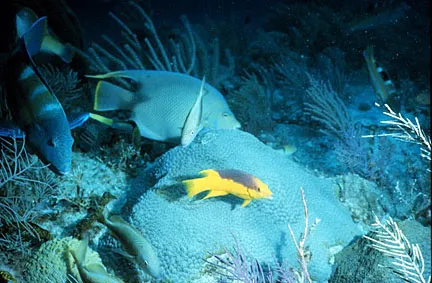Joan Kleypas - Ocean Scientist
Diving into the coral reef–climate connection

Joan Kleypas
Carlye Calvin, UCAR
"Jacques Cousteau was my idol while growing up," confesses Joanie Kleypas. The undersea world revealed in his groundbreaking television programs inspired Joanie to become an ocean scientist.
"Cousteau invented scuba gear, which meant people could go under water and start really looking at coral reefs, which was great for reef science," she explains. At NCAR, Joanie pursues her lifelong interest in the world’s fragile but vital coral reefs and their relationship to the whole Earth system.
Aside from their great beauty, reefs provide many services to the natural world and human society. They offer food and shelter to ocean creatures, and they protect nearby coastlines from the constant battering of ocean waves. Indeed, coral reefs adjacent to some coastal regions in the Indian Ocean appear to have lessened the impact of the recent tsunami.
Joanie credits her oldest brother for introducing her to scuba diving and the spirit of adventure when she was a teenager. The two explored the waters near their home in Port Arthur, Texas, where the Gulf of Mexico was often turbid with sediment and pollution. "The visibility wasn't that good," Joanie recalls, "but diving was the coolest thing." Though she was often seasick, she was hooked on investigating the oceans.
In high school Joanie took all the math and science classes available, and then headed to Lamar University in Beaumont, Texas, to study oceanography and marine biology. After obtaining a master's degree in marine science at the University of South Carolina, she finished her Ph.D. in Australia, at James Cook University.
In Australia, Joanie led an intrepid group of researchers who went out for weeks at a time to remote sections of the Great Barrier Reef. There, amidst strong currents and tides that swept twice daily between 13 and 23 feet, they operated heavy machinery to drill into the coral reefs and extract sample cores. The cores were "like dipsticks, little measuring devices" to study the geologic history of reef growth. Joanie found that, since the end of the last ice age, reefs flourished or faltered depending upon a delicate balance of conditions that included sea level, light, sediments, and circulation patterns.

The world's coral reefs are threatened by multiple stressors, including climate change.
NOAA
With her doctorate in hand, Joanie moved to Boulder, Colorado, which, she notes, gave her “equal access to all oceans.” After about a year working for an environmental consulting firm, she won a postdoctoral fellowship in NCAR's Advanced Studies Program.
Since she was now at a major supercomputing center, Joanie went to work on a computer model of coral reef growth. She used the model to examine the effects of growing reefs on climate. Coral reef growth releases carbon dioxide, the major greenhouse gas, into the atmosphere. Joanie found that reef growth since the last glacial period (18,000 years ago) could have contributed significantly to the atmospheric carbon dioxide content and thus the natural warming of the planet. Known as the coral reef hypothesis, this warming was far less than that now linked to the large amounts of carbon dioxide released since the industrial revolution by people burning fossil fuels.
When the postdoc was up, Joanie taught geology at Colorado College and resumed her consulting work while writing up the results of her research. "It was kind of like being a starving artist," she laughs. “I had to work to support my research habit.” She then came back to NCAR to help manage the U.S. Joint Global Ocean Flux Survey. That project introduced her to research on the ocean's physical processes and how they relate to climate. And her focus continued to sharpen: "Over time it became more and more clear that the ecosystem I was working on was much more affected by climate than the other way around.”
One example of climate’s impact captured headlines in the late 1990s when researchers around the world reported large-scale bleaching of corals and other organisms which house symbiotic plants in their tissues. Bleaching occurs when the tissues lose their algae and the coral skeletons show through, turning the coral a ghostly white color. Scientists quickly realized that higher ocean temperatures following the major 1997-98 El Niño caused the bleaching, which resulted in massive die-offs of organisms.
Questions about reef survival in a warming world are very much on the minds of ocean scientists. As a member of NCAR’s Institute for the Study of Society and Environment and then the NCAR Earth System Lab, Joanie has focused on the impacts on coral reefs of changes in temperature and changes in seawater chemistry.
"Being a coral reef scientist in a climate center has really been an opportunity," she notes—a chance not only to study the physical impacts of climate change but to examine how reef scientists think about threats to reef survival. From the recent bleaching die-offs around the globe to increased pollution and the predations of fishing boats using dynamite to catch more fish, the world's reefs are showing major signs of stress. The stressor Joanie continues to scrutinize is global warming: "If the water temperature increases faster than the reefs can adapt, it kills them."
Amidst the distress signals of climate change, Joanie still retains some optimism. "You have to fight sometimes," she says, whether it's to achieve career goals or to help save a vital but fragile ecosystem. And she considers herself lucky to lead the life of a scientist. "It's the excitement. You're always working on some sort of frontier."
by Zhenya Gallon
January 2005
Update:Joan Kleypas has received the Heinz Award for her pioneering research into the effects of climate change on coral reefs. (September 14, 2011)
Updated: September 2011